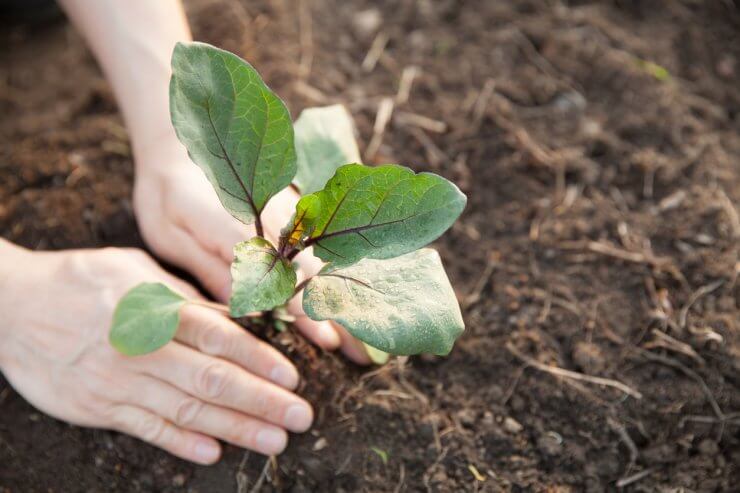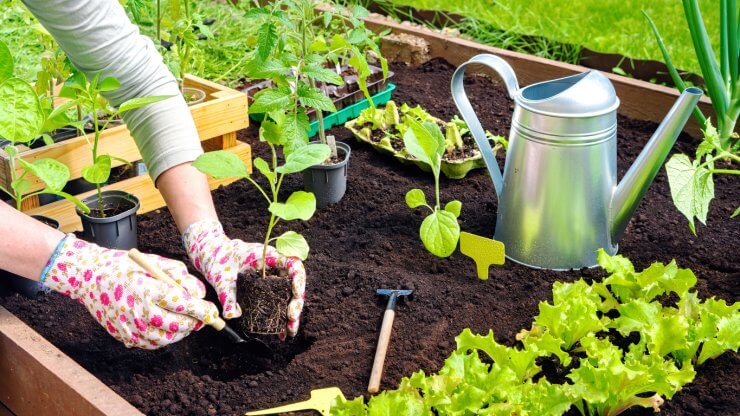
Gardener planting eggplant in the ground
Planting
The easiest way to decide if you should plant eggplants in the ground or in raised beds comes down to your climate. Eggplant thrives in warm, humid weather and if you don’t have a warm, humid growing season, you might be better off growing your eggplants in a raised bed or a container.
Raised beds and containers keep the soil warm, which is what eggplants want and need most, especially when starting out, so unless you live in an area where you can still have a beach day in the winter, then you’re best left to starting your seeds indoors and transplanting them outside later.
To plant directly in the ground, amend your soil with an inch or two of compost, and test your soil to make sure it has a pH of 5.5 to 7.0 and the nitrogen isn’t over 40 ppm. Planting eggplants in soil that is too high in nitrogen will give you tiny, bitter fruits.
You can plant seeds about 1/4 inch deep. Cover your seedlings with soil and water them. They should germinate within 10 days. When your plants are a few inches tall, you should thin them out, or remove the extra plants.
For seedlings that you start indoors, you’ll sow your eggplant seeds six to eight weeks before your expected last frost date. For best results, soak your seeds for 24 hours before you plant them, and use a seed-starting soil for the cleanest soil. It’s recommended to use a seedling tray with a greenhouse cover to keep them warm and humid until they sprout, preferably with a heat mat and grow light.
Seeds will germinate if they are kept consistently at a temperature between 60 to 90 degrees F. In 10 days, your seedlings will sprout.
Plant Spacing
When your seedlings get to be 2 to 3 inches tall, thin them to just one plant per hole. Don’t just yank the extra seedlings out—you could easily disrupt the root system of the plant you want to keep. A better approach is to use garden snips to cut the leaves off at soil level.
Your rows should be spaced 18 to 24 inches apart in rows that are at least 24 to 36 inches apart to give your plants room to grow and to give yourself some room to maneuver as you harvest.
As your eggplant grows, continue to add mulch to keep your soil warm.
Succession Planting and Crop Rotation
Eggplants will grow the full season, so you will only need to plant once and reap the rewards until it gets cold out.
However, nightshades like eggplants tend to strip the soil of key nutrients, so it’s best not to plant eggplants or another nightshade in the same plot the following year.
Instead, you’re best to plant eggplants after a crop from the grass family (like wheat). And after you’ve planted your eggplant crop, you should follow up with legumes in the same plot the following year, because they are great at fixing the soil.
Companion Planting

Gardener planting eggplant seedlings in a raised garden bed
There’s some controversy about whether nightshade vegetables should be planted together. On one hand, they have similar requirements for light, soil, and nutrients. On the other hand, they attract the same types of disease and pests. That said, if you already planned to plant three tomato plants in a row, there’s no reason why the plant in the middle couldn’t instead be an eggplant.
In terms of other friendly plants, beans grow well with eggplants because they have different needs and will replenish nitrogen in the soil. Beans are wonderful soil-fixers, and every garden can benefit from them.
Eggplants are also very leafy, so they can benefit some of the shorter sun-resistant crops like spinach and lettuces by shading them from the sun. Meanwhile broccoli is great at adding nutrients back into the soil while also keeping it moist, which is what every eggplant wants.
Raised beds
A raised garden bed or planter is an excellent option for growing eggplants. Given that eggplants like warm soil, there’s no better environment than a dark container or raised bed. In raised beds, in particular, the soil will be about 10 degrees warmer than the ground. Raised beds also help with moisture retention and can also be good for drainage, if needed. You can even buy raised beds or build one yourself to fit your space. Planters should have holes in the bottom of the container and a drip tray underneath to guard against root rot.
Watering and weeding will be easier if you have your eggplants in a raised bed or planter. It’s a good alternative to growing in open land. And if you fill a raised bed with packaged garden soil, you know you’re providing a cleaner and healthier environment for your plants from the outset.
Packaged garden soil means less weeding than you’d have from digging a hole in the ground; and with a raised bed or container, there’s less bending down to do your weeding!
How do you plant your eggplants? What criteria for site selection has worked for you? Do you use your eggplants as companion plants for their sun-adverse friends? Please share your ideas with us.


 Previous
Previous

